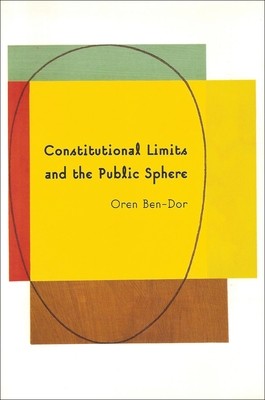
- We will send in 10–14 business days.
- Author: Oren Ben-Dor
- Publisher: Hart Publishing
- Year: 2000
- Pages: 336
- ISBN-10: 1841131113
- ISBN-13: 9781841131115
- Format: 16.5 x 23.4 x 3.3 cm, hardcover
- Language: English
- SAVE -10% with code: EXTRA
Reviews
Description
The place of utility as a critical theory of human existence has been largely discredited and its potential undermined in the course of modern debates in ethical, political and legal theory. The central intuition that guides the argument of this book is that both the technical and reductionist methodology associated with utilitarianism do not do justice to the theory which identifies the maximisation of pleasure as the most fundamental self-interest of man.
Enlarging upon this intuition, the book is mainly concerned with critical constitutionalism. Based on a close reading of Bentham's unpublished and recently published texts, the argument in the first part shows that a critical analysis of constitutionally limited government formed a central theme of Bentham's utilitarian enterprise. The theme of the author's reconstruction is that, for Bentham, constitutional limits signified socially dynamic relationships within the public sphere and between this sphere and a centralised coercive authority. Because this relationship is socially dynamic, the ever-changing communal-based conception of harm constantly transforms the relationship between law and the community which it governs. This feature reappears in many layers of Bentham's thought, such as his theory of sovereignty, the duty to obey the law, and the motivational basis for forming and transforming a conception of harm within the public sphere. Even the most revisionist of Bentham scholars fail to capture this central unifying theme in Bentham's writings.
The second part of the book further develops this reconstruction. It argues that an underdeveloped insight of critical importance characterised Bentham's utilitarianism. This insight helps to elucidate the transient and dynamic connection of ethics to politics. In critically reviewing five contemporary accounts of this connection, utility is shown to have closer affinities with communitarianism. However as a critical theory, utility has more in common with the Habermasian notion of communication and inter-subjectivity than with Humean conventionalism. The utilitarian critic is in a position to transcend not only the simple hedonism with which utilitarianism has always been associated, but also the historically-ridden perspectives which potentially dogmatise the range of human possibilities under a received conception of harm.
EXTRA 10 % discount with code: EXTRA
The promotion ends in 18d.05:51:56
The discount code is valid when purchasing from 10 €. Discounts do not stack.
- Author: Oren Ben-Dor
- Publisher: Hart Publishing
- Year: 2000
- Pages: 336
- ISBN-10: 1841131113
- ISBN-13: 9781841131115
- Format: 16.5 x 23.4 x 3.3 cm, hardcover
- Language: English English
The place of utility as a critical theory of human existence has been largely discredited and its potential undermined in the course of modern debates in ethical, political and legal theory. The central intuition that guides the argument of this book is that both the technical and reductionist methodology associated with utilitarianism do not do justice to the theory which identifies the maximisation of pleasure as the most fundamental self-interest of man.
Enlarging upon this intuition, the book is mainly concerned with critical constitutionalism. Based on a close reading of Bentham's unpublished and recently published texts, the argument in the first part shows that a critical analysis of constitutionally limited government formed a central theme of Bentham's utilitarian enterprise. The theme of the author's reconstruction is that, for Bentham, constitutional limits signified socially dynamic relationships within the public sphere and between this sphere and a centralised coercive authority. Because this relationship is socially dynamic, the ever-changing communal-based conception of harm constantly transforms the relationship between law and the community which it governs. This feature reappears in many layers of Bentham's thought, such as his theory of sovereignty, the duty to obey the law, and the motivational basis for forming and transforming a conception of harm within the public sphere. Even the most revisionist of Bentham scholars fail to capture this central unifying theme in Bentham's writings.
The second part of the book further develops this reconstruction. It argues that an underdeveloped insight of critical importance characterised Bentham's utilitarianism. This insight helps to elucidate the transient and dynamic connection of ethics to politics. In critically reviewing five contemporary accounts of this connection, utility is shown to have closer affinities with communitarianism. However as a critical theory, utility has more in common with the Habermasian notion of communication and inter-subjectivity than with Humean conventionalism. The utilitarian critic is in a position to transcend not only the simple hedonism with which utilitarianism has always been associated, but also the historically-ridden perspectives which potentially dogmatise the range of human possibilities under a received conception of harm.


Reviews